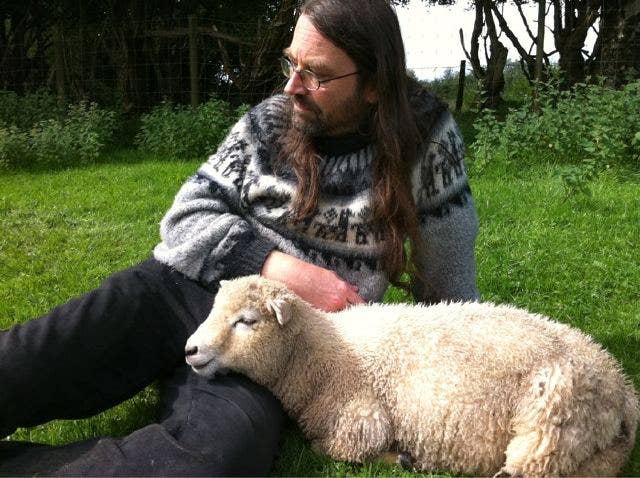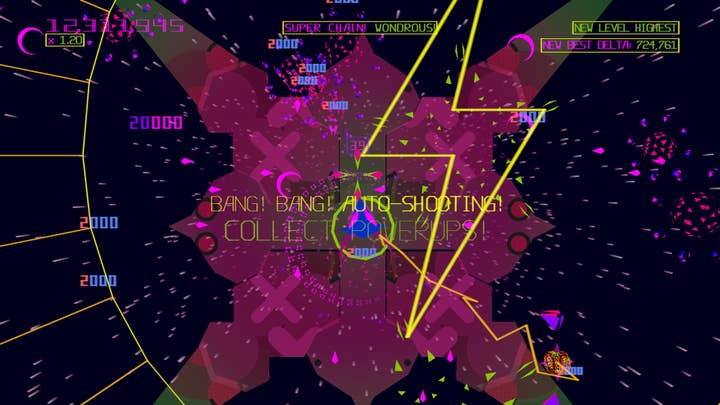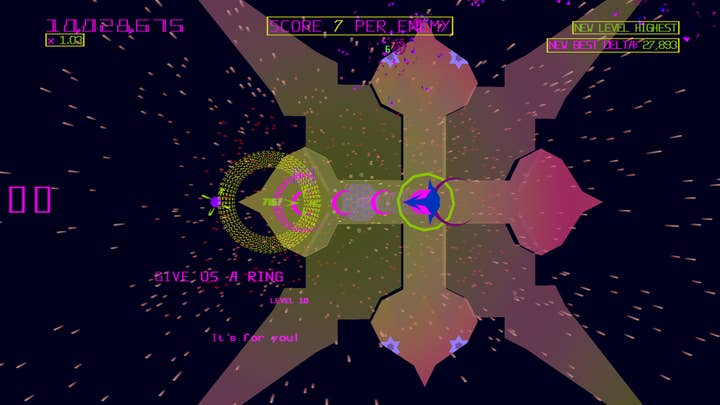Jeff Minter on making a respectful cover
Tempest 2000 developer on reinventing another Atari arcade game in Akka Arrh, the line between taking influence and cloning, and adding accessibility
Jeff Minter and Atari have history. The veteran developer worked on Atari hardware dating back to the 8-bit home computers of the early '80s and his sequels to the arcade classic Tempest have been among the publisher's most celebrated releases of the past 30 years.
So when Atari approached Minter with the idea of another Tempest 2000-like reinterpretation, he didn't require too much convincing. But rather than going for Centipede, Asteroids, or any of an array of other Atari classics that have been re-done numerous times over the years, Minter opted for a deeper cut.
"They just sent me their back catalog of titles they owned the IP to, and I went through that and chose Akka Arrh because it sounded interesting," Minters tells GamesIndustry.biz.
Akka Arrh is not a household name. In fact, Atari never actually released the original arcade game, which only made it to the prototype phase in 1982 before being mothballed and largely forgotten. But in recent years, a ROM of the game leaked online and interested parties got their first chance to actually try out the long lost title.

"I've got particular taste in games. I like abstract stuff, and this is all quite abstract," Minter says, adding, "The game itself is quite an interesting design. It's got this upstairs/downstairs thing going on where the battle starts on the top layer and then proceeds down to the bottom and you have to switch between the two surfaces to defend yourself. I quite liked that and the look of the game. It has a nice abstract feel to it. The battle took place on a geometric surface that lit up as you fired shots onto it. It just seemed quite interesting."
The arcade prototype requires a complex bit of plate-spinning from the player, and the zoom-in/zoom-out, upstairs/downstairs mechanic certainly would have made it stand out from the rest of the crowd in 1982.
"That's one of the aspects I liked," Minter says of the complexity. "It was ambitious in what it was trying to do. I think if they'd given it more time and worked on the gamefeel a bit more, it could have been turned into something really good."
Unfortunately, Atari thought the original arcade game wasn't quite ready for release.
"On Tempest, I was starting with a stone cold classic. On this I was starting with something a bit flawed"
"They put it through a field test and people didn't actually play the game much," Minter says. "It wasn't interesting enough to keep players coming back, so I thought it would be quite an interesting challenge as well to take this flawed game, maybe try and massage the idea a bit, work a bit of me own magic on it and turn it into something decent."
He adds, "I had to do a bit more surgery on this one than I did, say, on Tempest. On Tempest, I was starting with a stone cold classic. On this I was starting with something a bit flawed."
Minter says he wanted to keep the basic structure of the game intact, specifically its upstairs/downstairs gameplay mechanic, but other aspects were more negotiable.
"I altered things in a way which I always do going from an arcade game to a home game anyway and bumped things down a bit," Minter says. "I made it so rather than the game being super hard so it can kick you off every few minutes and get you to put more money in, it's more amenable to settling you in and maybe you sit down for a good long session."
At the same time, he wanted to be true to the work of the original developers.
"I hope the original guys will recognize some of their original work still remains inside it," Minter says. "I always try to be respectful when I'm doing this kind of thing. It's possible to go too far and get too far away from the original spirit of the thing."
"I hope the original guys will recognize some of their original work still remains inside it"
That said, he acknowledges he hasn't been in communication with the original team.
"I think they would be quite surprised," Minter says of his reworking. "I hope they won't be offended though."
Minter has a rare perspective as a developer, in that much of his body of work has been readily and transparently influenced by specific previous games and developers. At the same time, the personal style that makes his work so distinctive it has influenced plenty of other developers. Given how much Minter has seen obvious influence flowing upstream and downstream, we ask him for his thoughts on the line between an homage and a clone game.
"If you're doing an official clone of a game, you need to be respectful about it," he says. "But where clones get a bad name is where they just feed off an existing game that's quite good and end up producing something that isn't good.

"There was a lot of that back in the 8-bit days where you had games like Space Invaders. There are a million shitty versions of Space Invaders that people were just selling because people wanted Space Invaders games back then. So they didn't mind the quality of what they were doing and didn't respect the source material at all. I don't think there's quite so much of that around these days, maybe in the mobile arena there is where anything bloody goes. Away from mobile you don't get too much of that kind of stuff.
"If you're going to copy something and it's not an official copy, then at least put some originality into it"
"I'm heavily influenced by the work of Eugene Jarvis, for example. And I've done games that could be considered clones of his games in some ways. Like I did Llamatron years ago, and yes it's obviously very heavily based on Robotron. But I tried to make it its own thing as well. If you're going to copy something and it's not an official copy, then at least put some originality into it. Make some of it your own… There's an awful lot of me in there and an awful lot of Eugene."
As for when he sees developers incorporate elements of his own style into their work in an additive way, Minter says he's "quite flattered" by it.
One hallmark of Minter's style has been his affinity for psychedelic visuals and flashing lights, so much so that he says he's gotten feedback from photosensitive players everytime he's released something on consoles for the past 10 or 15 years.
For Akka Arrh, one of the marketing points Atari is stressing for the game is accessibility, with an option to disable "the more intense visual effects" for anyone who doesn't enjoy them.
Minter says he enjoys what he calls "the more hardcore effects," but when Atari suggested making them optional, he readily obliged.
"If it makes the game more accessible to other people, that's fine. I can put it in, it doesn't cost a lot of time to put it in," Minter says, noting the original version is still in there for anyone who doesn't mind the effects.
"The people really have changed completely. But the [Atari] brand is still kind of there, and I still feel associated with it"
"It's a tiny amount of extra work that makes it possible for more people to enjoy the game, so I think it's something that's worth doing."
The last thing we ask about is Minter's ongoing partnership with Atari. It's certainly not unheard of for a developer and a publisher to work together repeatedly over the years, but it's less common when one of those partners repeatedly changes into an entirely different entity over that span.
"Atari's kind of discontinuous, isn't it," Minter points out. "You had the original pre-Warner Bros. Atari making coin-op, then Warner Bros. doing VCS, then Trammiel Atari, then Hasbro, then Infogrames. The consistent thing of it all is the name and back catalog I suppose. The people really have changed completely. But the brand is still kind of there, and I still feel associated with it. It's always been there since I was into games. It was there when I was growing up.
"Obviously it's changed. It's not the same as it was when I first started working there. It's not the same as it was when I first started playing Atari games. But something of Atari remains and I'm quite happy to be working with them rather than working against them."

